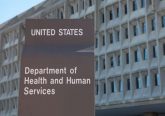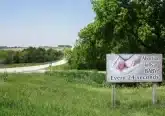Sharonville abortion clinic closes its doors
Seven years of prayers answered
By Walt Schaefer
Prayer and perseverance have saved lives of the unborn in Sharonville, where, just days before Christmas, an abortion clinic closed as it had opened: without fanfare.
One of two southwest Ohio abortion businesses owned by Martin Haskell, known for popularizing the technique called “partial-birth abortion,” the Women’s Med Center moved from Cincinnati’s Clifton neighborhood to Sharonville in 2010. The Clifton location had been the center of years of protests. Haskell opened the doors of his new business in a building next to a pediatrician’s office without advance notice to the community, which came together to oppose it.
Beginning in January 2011, weekly Saturday prayer vigils, spring and fall 40 Days for Life vigils, and many other peaceful protests combined with state and local legal action, and with community efforts spearheaded by then-Mayor Virgil Lovitt. Dayton’s largest group of pregnancy care centers, Elizabeth’s New Life Center, opened a pro-life practice directly across the street, to give women an option to abortion even on their way in the door.
Key to organizing the pro-life effort was Mary Jo Suer, who chairs the Respect Life Ministry at St. Maximilian Kolbe Parish in Butler County’s Liberty Township. Suer is quick to stress she was but the catalyst who helped bring people together. “It was God’s call,” she said. That call led to the impassioned effort to confront the abortion mill.”
Despite the business’s innocuous name, Suer explained, “they are abortion specialists. He did late-term abortions through August 2014.”
When Haskell wasn’t able to secure a transfer agreement to treat patients with complications at an area hospital, eventually losing a battle with the state to keep its surgical license, pro-life leaders hoped the practice would close. Instead, Haskell “went down to two days a week, and they were referring their surgical abortions to [his second business in] Kettering and did abortion consulting and some chemical abortions.” Through it all, the protesters maintained their vigils.
“Every Saturday for almost seven years, there were different churches there each week,” Suer said. “St. Susanna, Mason, had the first Saturday. The second Saturday was Sts. Peter and Paul, Reading. The third was St. Maximilian Kolbe; the fourth St. Gertrude, Madeira.”
A typical Saturday vigil broght 25 to uo people, she said. Catholics were joined by Protestants, many from Sharonville’s Grace Bible Presbyterian Church. Other Catholic parishes joined in the effort as able, including St. Michael, Sharonville, located a few blocks from the center; as well as St. Ann, Hamilton; Sacred Heart, Fairfield; St. John the Evangelist, West Cheste ; and the St. John Knights of Columbus Council.
Occasionally, pregnant girls heading to Haskell’s clinic would listen to the protesters, Suer said. “Some left. We would give them information.” Some women would confuse Haskell’s center with pro-life practice. “We would tell them we don’t do abortions here, but we do offer ultrasound,” Seur said.
“The girls could get their ultrasound, and oftentimes, that would change their minds. We had to keep our encouragement up and covered it in shifts outside of Dr. Brinn’s office. We never knew what words we said possibly made a difference and we won’t know that until we die.”
Protesters couldn’t enter Haskell’s property but Dr. Brinn, a long-time Sharonville pediatrician, welcomed them. “For a pediatrician to be next to an abortion clinic is crazy,” he said. “When I found out what the guy was doing, I went absolutely nuts and I just thought of all the things I could do.
“I can’t tell people what to do… but I can certainly make the women aware of their options, and we did by talking to them just outside my door in the employee’s parking lot or bringing them inside. We gave them other options — people who could help them in different ways so they would not have to have an abortion.
“Another thing we did was with Sharonville Mayor Virgil Lovett who, at the time, brought his kids to me,” he added. “We knew each other well and worked very hard together. Actually, the Ohio Health Department was the real problem. They allowed him to break every rule — basically — by not having transfer agreements and giving variances.
“We did research that showed questionable things there, and we sent that to the Ohio Department of Health. We kept the pressure up with the governor. We went to Columbus. “
In 2013, Right to Life of Greater Cincinnati awarded Mayor Lovitt its Warrior for Life Award for his work opposing the business.
“There were so many different components to all of this,” Brinn said. “The idea was to keep pressure on this guy and to close the place down, which is what finally happened.” But first, he explained, “the health department finally said ‘you’re not in agreement with these guidelines, and told him he can’t do any surgery there.
“He was doing chemical abortions after he stopped surgical abortions. It’s very dangerous to just give a woman a pill, they go home and anything can happen. It was always dangerous, and there were ambulances coming there all the time — ladies going into seizures, all kinds of horrible things were happening. That was part of what we tried to convey to people.”
When the doors closed and didn’t reopen, Suer, Brinn, and others who had spent years praying outside waited cautiously to see if it was a temporary ploy. But the parking lot stayed empty, the doors stayed locked, and the community that worked to shut the business down will celebrate in the parking lot of the pregnancy care center across the street.
“In my heart, it was the constant prayer, the power of prayer” that made the difference, Suer said.
“It was just our perseverance in prayer and witness to the Gospel of life over the culture of death. And we still pray for Haskell’s conversion.”
“What was beautiful about it,” said Right to Life of Greater Cincinnati’s executive director, Paula Westwood, “was that we were united at the government level, the Right to Life level, the legal level, the prayer warrior level. Our hope and our prayer truly is that the abortionist, and those who work for him, will come to see the truth and will convert.
“The power of prayer happened because he moved there and the Sharonville Respect Life Ministry was born,” Westwood said. “Mary Jo decided to publicize it and became the leader of it. That’s a beautiful thing. People came together. Churches came together — Catholic and Protestant… city government was always helping and watching for a way to close it; and we’re hoping this is the beginning of a trend — the beginning of something more.
“Because of what happened in Sharonville and the publicity it got, consciousness has been raised and women are more aware of the true nature of abortion.”
Sharonvillle pro-life leaders will hold a gathering to celebrate the business’s closing on May 6; see below for details.
A Celebration of Thanksgiving: Closing of the Abortion Mill
“The Blessing of Being a Witness to the Gospel of Life.”
- May 6 , 2 p.m.
- Place: Women’s Center Sharonville prolife pregnancy care center parking lot (acrros from the Haskell business)
- Speakers: Representatives of the many who have come to Sharonville to pray and work to end the killing of babies, the wounding of their mothers, and the closing of the clinic













